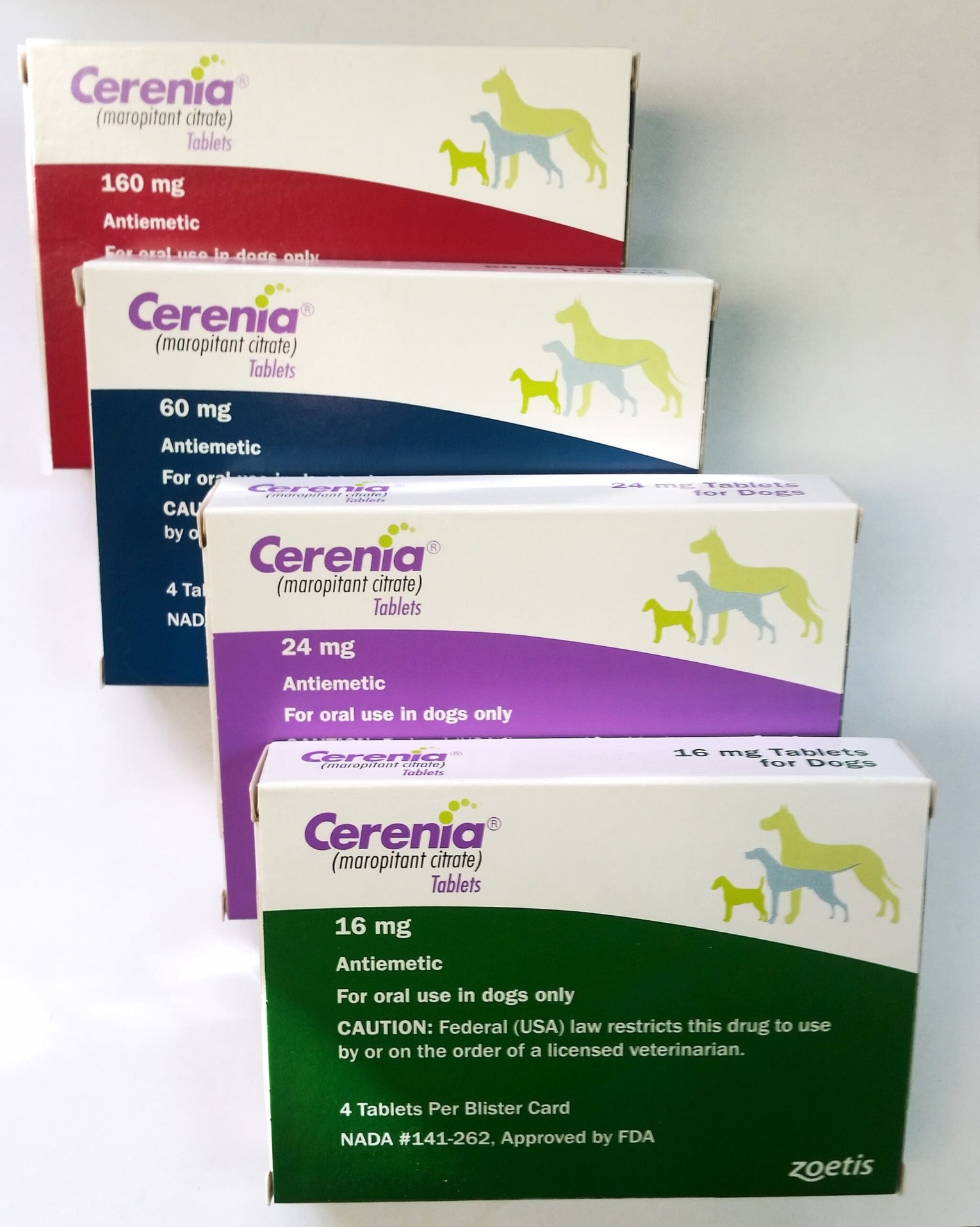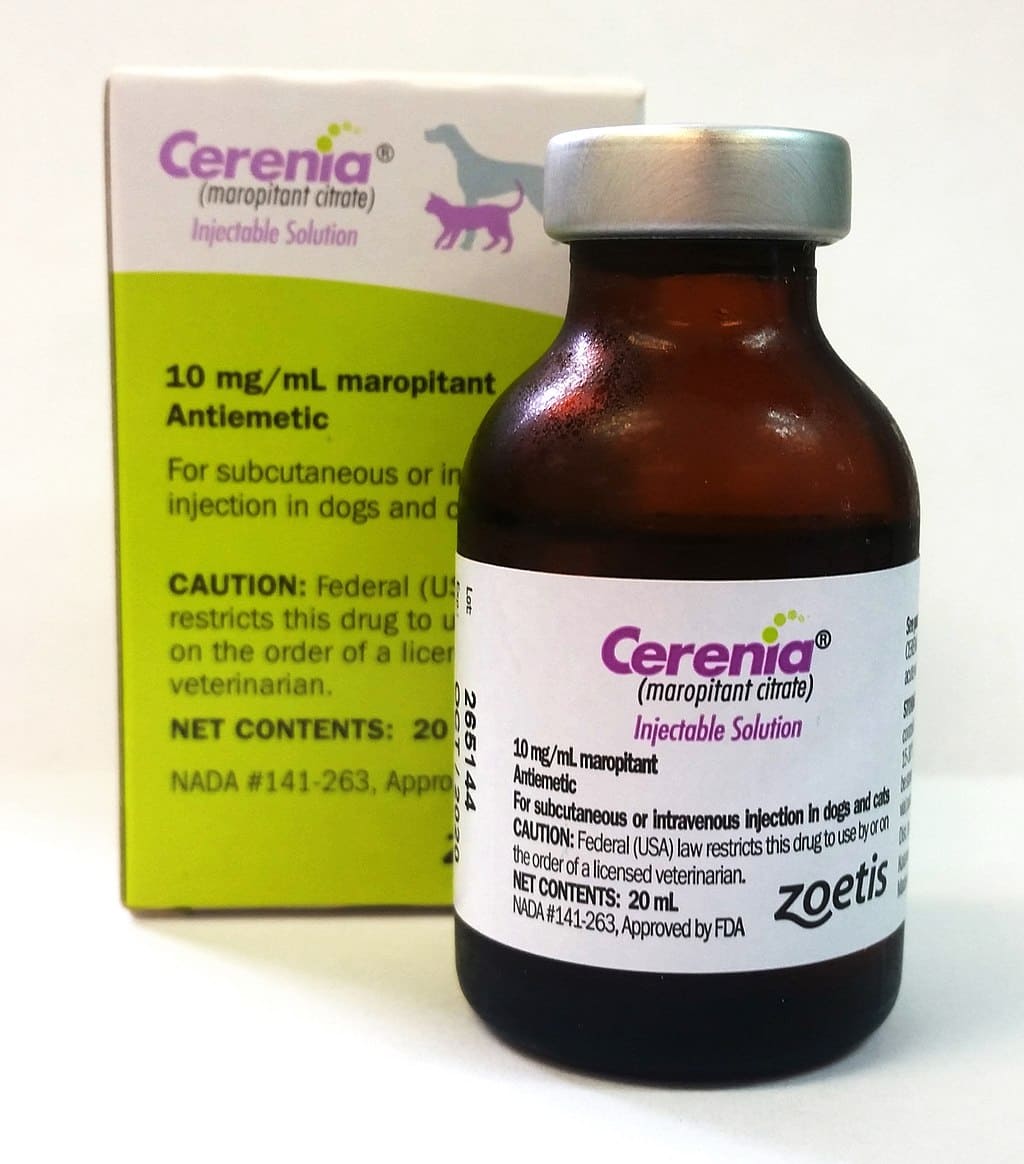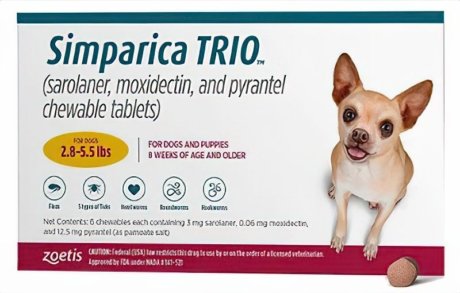Cerenia For Dogs: A Comprehensive Guide to Managing Canine Nausea
When it comes to our furry companions, their health and well-being are of utmost importance. One common concern among dog owners is motion sickness and nausea in their pets, which can be distressing for both the dog and its owner. In such cases, Cerenia for dogs has emerged as a valuable solution. In this extensive guide, we will explore the world of Cerenia, its uses, benefits, potential side effects, and much more, ensuring your canine friend stays happy and healthy.
Understanding Cerenia

What Is Cerenia?
Cerenia is a prescription medication designed specifically for dogs. It belongs to a class of drugs known as antiemetics, which are used to prevent and treat nausea and vomiting. The active ingredient in Cerenia is maropitant citrate.
How Does Cerenia Work?
Maropitant citrate, the key component of Cerenia, works by blocking certain receptors in the brain known as neurokinin-1 receptors. These receptors play a crucial role in triggering nausea and vomiting. By blocking them, Cerenia effectively prevents these unwanted symptoms.
Cerenia Injection For Dogs
Cerenia is a medication commonly prescribed for dogs to help manage and prevent nausea and vomiting, particularly associated with motion sickness or following surgical procedures. While Cerenia is available in various forms, including oral tablets, it can also be administered as an injectable medication, commonly referred to as “Cerenia Injection.”
Here are some key points about Cerenia Injection for dogs:
- Active Ingredient: The active ingredient in Cerenia is maropitant citrate, which belongs to a class of drugs known as neurokinin-1 (NK1) receptor antagonists. Maropitant works by blocking signals in the brain that trigger nausea and vomiting.
- Uses:
- Motion Sickness: Cerenia Injection can be given to dogs before travel to prevent motion sickness, a condition characterized by drooling, vomiting, and discomfort during car rides or other forms of transportation.
- Post-Surgery Nausea: After surgical procedures, dogs may experience nausea and vomiting. Cerenia can help alleviate these symptoms and aid in the recovery process.
- Other Causes of Nausea and Vomiting: In some cases, veterinarians may prescribe Cerenia Injection for dogs with nausea and vomiting caused by factors such as gastrointestinal issues or medication side effects.
- Dosage and Administration: The dosage and administration of Cerenia Injection depend on the specific condition being treated, the dog’s size and weight, and the veterinarian’s recommendations. It is typically administered by a veterinary professional, either as an intravenous (IV) injection or as an injection under the skin (subcutaneous). The frequency of administration may vary.
- Effectiveness: Cerenia is generally effective in preventing and treating nausea and vomiting in dogs. It is particularly useful for dogs that frequently experience motion sickness during car rides or travel.
- Side Effects: While Cerenia is considered safe for most dogs, there can be potential side effects. These may include lethargy, loss of appetite, diarrhea, or drooling. If any concerning side effects occur, it’s essential to contact your veterinarian.
- Prescription Medication: Cerenia is a prescription medication, which means it can only be obtained with a valid prescription from a licensed veterinarian. It’s crucial to follow your veterinarian’s instructions regarding the proper use and dosage of Cerenia for your dog.
- Precautions: Cerenia may not be suitable for all dogs, especially those with certain medical conditions or known sensitivities to the medication. Inform your veterinarian about your dog’s complete medical history and any medications or supplements they are currently taking.
Cerenia Tablets For Dogs

Cerenia is a medication used in veterinary medicine to manage and prevent nausea and vomiting in dogs. Cerenia is available in tablet form, making it convenient for dog owners to administer. Here’s what you should know about Cerenia tablets for dogs:
1. Active Ingredient:
- The active ingredient in Cerenia tablets is maropitant citrate. Maropitant is classified as a neurokinin-1 (NK1) receptor antagonist. It works by blocking certain signals in the brain that trigger nausea and vomiting.
2. Uses:
- Motion Sickness: Cerenia tablets can be prescribed to dogs to prevent motion sickness. Motion sickness in dogs can lead to symptoms like drooling, restlessness, vomiting, and discomfort during car rides or other forms of transportation.
- Post-Surgery Nausea: After surgical procedures, dogs may experience post-operative nausea and vomiting. Cerenia can help alleviate these symptoms and aid in the recovery process.
- Management of Nausea and Vomiting: Cerenia may also be used for dogs experiencing nausea and vomiting due to various causes, including gastrointestinal issues or the side effects of other medications.
3. Dosage and Administration:
- The specific dosage and administration instructions for Cerenia tablets will depend on your dog’s size, weight, and the underlying condition being treated. It is typically administered orally, either with or without food, as directed by your veterinarian.
- Always follow your veterinarian’s recommendations regarding the dosage and administration schedule.
4. Effectiveness:
- Cerenia tablets are generally effective in preventing and managing nausea and vomiting in dogs. They are particularly useful for dogs that experience motion sickness during travel or for those recovering from surgical procedures.
5. Side Effects:
- While Cerenia is considered safe for most dogs, some dogs may experience side effects. Common side effects can include lethargy, loss of appetite, diarrhea, or drooling. If any concerning side effects occur, consult your veterinarian.
6. Prescription Medication:
- Cerenia is a prescription medication, which means it can only be obtained with a valid prescription from a licensed veterinarian. It’s essential to consult your veterinarian to determine if Cerenia is appropriate for your dog and to receive the correct prescription.
7. Precautions:
- Inform your veterinarian about your dog’s complete medical history, including any underlying health conditions or allergies. This information will help your veterinarian make an informed decision about the use of Cerenia.
- If your dog is taking other medications or supplements, discuss these with your veterinarian to ensure there are no potential interactions.
Cerenia Dosage For Dogs
The appropriate Cerenia dosage for dogs depends on several factors, including the dog’s weight, the condition being treated, and your veterinarian’s recommendations. Cerenia (maropitant citrate) is commonly prescribed to manage and prevent nausea and vomiting in dogs. Here are some general guidelines for Cerenia dosage:
- Motion Sickness:
- For the prevention of motion sickness in dogs, Cerenia tablets are typically prescribed at a dosage of 8 mg per kilogram (3.63 mg per pound) of the dog’s body weight.
- This dosage is typically administered 2 hours before travel. It can be given with or without food.
- Post-Surgery Nausea:
- After surgery, Cerenia may be used to manage post-operative nausea and vomiting.
- The dosage for post-surgery use is also typically 8 mg per kilogram of the dog’s body weight, and it is often given once a day for up to 5 days post-surgery.
- Other Causes of Nausea and Vomiting:
- When Cerenia is prescribed for other causes of nausea and vomiting, such as gastrointestinal issues or medication side effects, the dosage can vary. Your veterinarian will determine the appropriate dosage based on your dog’s specific condition.
It’s important to note that the Cerenia dosage for your dog should always be determined by your veterinarian. They will take into account your dog’s individual characteristics and the underlying cause of the nausea and vomiting to prescribe the most suitable dose.
Additionally:
- Cerenia tablets are available in various strengths, such as 16 mg, 24 mg, 60 mg, and 160 mg. Your veterinarian will select the appropriate tablet strength and provide instructions on how many tablets to give your dog based on their weight and the desired dosage.
- Follow your veterinarian’s specific administration instructions, which may include giving the tablet with or without food.
- Always complete the full course of Cerenia as prescribed, even if your dog’s symptoms improve before the medication is finished.
- If you have any concerns about the Cerenia dosage or your dog’s response to the medication, do not hesitate to contact your veterinarian for guidance and clarification. Your veterinarian is the best resource for ensuring your dog receives the correct dosage and appropriate care.
Cerenia For Dogs Side Effects
Cerenia (maropitant citrate) is a medication commonly prescribed for dogs to manage and prevent nausea and vomiting. While Cerenia is generally considered safe and effective, like any medication, it can potentially cause side effects in some dogs. It’s important to be aware of these side effects and to consult your veterinarian if you have concerns. Here are some common Cerenia side effects in dogs:

- Lethargy (Tiredness): Some dogs may experience mild lethargy or drowsiness after taking Cerenia. This is a relatively common side effect and usually resolves as the medication wears off.
- Loss of Appetite: A decrease in appetite, or in some cases, complete loss of appetite, can occur in dogs taking Cerenia. This side effect is typically temporary and should improve once the medication is discontinued.
- Drooling: Excessive salivation or drooling may occur in some dogs as a side effect of Cerenia. This is generally not a cause for concern and usually subsides on its own.
- Diarrhea: Some dogs may experience diarrhea as a side effect of Cerenia. If diarrhea is severe, persistent, or accompanied by other concerning symptoms, contact your veterinarian for guidance.
- Vomiting: Ironically, while Cerenia is used to prevent vomiting, some dogs may experience vomiting as a side effect. If vomiting persists or is severe, consult your veterinarian.
- Behavioral Changes: In rare cases, dogs may exhibit unusual behavior or agitation while taking Cerenia. If this occurs, contact your veterinarian for guidance.
- Allergic Reactions (Rare): Although rare, some dogs may have an allergic reaction to Cerenia. Signs of an allergic reaction can include facial swelling, difficulty breathing, hives, vomiting, diarrhea, or collapse. If you observe any of these severe symptoms, seek immediate veterinary attention.
What Is Cerenia Used For In Dogs
Cerenia is a medication commonly prescribed for dogs to manage and prevent nausea and vomiting. It is particularly useful in various situations where dogs are prone to experiencing these symptoms. Here’s what Cerenia is used for in dogs:
- Motion Sickness: Cerenia is often prescribed to prevent and alleviate motion sickness in dogs. Motion sickness can occur during car rides, boat trips, or flights and can lead to symptoms such as drooling, restlessness, vomiting, and discomfort. Cerenia helps make travel more comfortable for dogs by reducing the likelihood of motion sickness.
- Post-Surgical Nausea and Vomiting: After surgical procedures, dogs may experience nausea and vomiting as a side effect of anesthesia or other medications. Cerenia can be administered to manage and alleviate these symptoms, helping dogs recover more comfortably.
- Preventative Use Before Surgery: In some cases, veterinarians may administer Cerenia to dogs as a preventative measure before surgery. This helps reduce the risk of post-operative nausea and vomiting, making the recovery process smoother.
- Management of Gastrointestinal Issues: Cerenia can be used to manage nausea and vomiting associated with various gastrointestinal issues, such as gastritis, inflammatory bowel disease, or other gastrointestinal disorders.
- Chemotherapy-Induced Nausea: Dogs undergoing chemotherapy for cancer treatment may experience nausea and vomiting as side effects of the treatment. Cerenia can help manage these symptoms, improving the dog’s overall well-being during cancer therapy.
- Other Causes of Nausea and Vomiting: Cerenia may also be prescribed for dogs experiencing nausea and vomiting due to factors like dietary indiscretion, toxin ingestion, or as a side effect of other medications.
Cerenia works by blocking certain signals in the brain that trigger nausea and vomiting. It is generally considered safe and effective for managing these symptoms in dogs. However, it should only be used under the guidance and prescription of a licensed veterinarian.
Cerenia 60 Mg For Dogs
Cerenia is a medication commonly used in veterinary medicine to manage and prevent nausea and vomiting in dogs. The dosage of Cerenia prescribed for a dog depends on various factors, including the dog’s weight, the specific condition being treated, and your veterinarian’s recommendations.

A Cerenia dose of 60 mg typically refers to the strength of the Cerenia tablet. In this case, it is the strength of a single tablet. Here’s what you should know about Cerenia 60 mg for dogs:
- Strength of the Tablet: Cerenia tablets are available in various strengths, including 16 mg, 24 mg, 60 mg, and 160 mg. The strength of the tablet determines how much of the active ingredient, maropitant citrate, is in each tablet.
- Dosage Calculation: The appropriate dosage of Cerenia for your dog will be determined by your veterinarian based on your dog’s weight and the condition being treated. The dosage is typically given in milligrams per kilogram (mg/kg) of the dog’s body weight.
- Usage: Cerenia 60 mg tablets are often prescribed for larger dogs or for dogs requiring a higher dose to effectively manage nausea and vomiting. Smaller dogs may receive lower-strength tablets.
- Administration: Cerenia tablets are administered orally and can be given with or without food, as directed by your veterinarian. Always follow your veterinarian’s specific dosing instructions.
- Treatment Duration: The duration of Cerenia treatment will depend on the underlying condition. For example, it may be used as a one-time preventative measure for motion sickness before travel, or it may be given for several days following surgery or to manage chronic conditions.
- Prescription Medication: Cerenia is a prescription medication, meaning it can only be obtained with a valid prescription from a licensed veterinarian. It’s essential to consult your veterinarian to determine the appropriate strength and dosage of Cerenia for your dog’s specific needs.
- Monitoring: While using Cerenia, it’s important to monitor your dog for any changes in behavior or the resolution of nausea and vomiting. If you have concerns or if your dog’s condition does not improve, contact your veterinarian.
Cerenia 60 mg tablets are a useful option for managing and preventing nausea and vomiting in larger dogs or those requiring a higher dosage of the medication. Always work closely with your veterinarian to ensure your dog receives the correct dosage and appropriate care. Your veterinarian will consider your dog’s individual characteristics and the specific condition being treated when determining the most suitable treatment plan.
Cerenia 16 Mg For Dogs
Cerenia is a medication commonly used in veterinary medicine to manage and prevent nausea and vomiting in dogs. The dosage of Cerenia prescribed for a dog depends on various factors, including the dog’s weight, the specific condition being treated, and your veterinarian’s recommendations.
Cerenia 16 mg refers to the strength of the Cerenia tablet, indicating that each tablet contains 16 milligrams of the active ingredient, maropitant citrate. Here’s what you should know about Cerenia 16 mg for dogs:
- Tablet Strength: Cerenia tablets are available in different strengths, including 16 mg, 24 mg, 60 mg, and 160 mg. The tablet’s strength determines the amount of maropitant citrate in each tablet.
- Dosage Calculation: The appropriate dosage of Cerenia for your dog will be determined by your veterinarian based on your dog’s weight and the specific condition being treated. The dosage is typically expressed in milligrams per kilogram (mg/kg) of the dog’s body weight.
- Usage: Cerenia 16 mg tablets are often prescribed for smaller dogs or for dogs requiring a lower dose to effectively manage nausea and vomiting. Larger dogs may receive higher-strength tablets.
- Administration: Cerenia tablets are administered orally and can be given with or without food, following your veterinarian’s specific dosing instructions.
- Treatment Duration: The duration of Cerenia treatment depends on the underlying condition. For example, it may be used as a one-time preventative measure for motion sickness before travel, or it may be given for several days following surgery or to manage chronic conditions.
- Prescription Medication: Cerenia is a prescription medication, meaning it can only be obtained with a valid prescription from a licensed veterinarian. It’s crucial to consult your veterinarian to determine the appropriate strength and dosage of Cerenia for your dog’s specific needs.
- Monitoring: While using Cerenia, it’s essential to monitor your dog for any changes in behavior or the resolution of nausea and vomiting. If you have concerns or if your dog’s condition does not improve, contact your veterinarian.
Cerenia For Dogs Upset Stomach
Cerenia (maropitant citrate) is a medication commonly used in veterinary medicine to manage and prevent nausea and vomiting in dogs. While Cerenia is typically prescribed to address these symptoms, it can sometimes be used to help dogs with upset stomachs, especially if nausea and vomiting are part of the issue. Here’s how Cerenia can be beneficial for dogs with upset stomachs:
- Nausea Relief: Upset stomachs in dogs can often be accompanied by feelings of nausea. Cerenia is effective at reducing nausea by blocking signals in the brain that trigger the vomiting reflex. This can provide relief to dogs experiencing queasiness or discomfort due to an upset stomach.
- Preventing Vomiting: Dogs with upset stomachs may be prone to vomiting. Cerenia helps prevent or reduce episodes of vomiting, which can be distressing for both dogs and their owners.
- Motion Sickness: If your dog’s upset stomach is related to motion sickness (e.g., car rides or travel-induced nausea), Cerenia can be used as a preventative measure to alleviate motion sickness symptoms.
- Post-Surgery Recovery: Dogs recovering from surgery may experience an upset stomach or nausea as a side effect of anesthesia or other medications. Cerenia can be prescribed to help manage these symptoms and improve the dog’s overall comfort during the recovery process.
- Chronic Gastrointestinal Issues: In some cases, dogs with chronic gastrointestinal conditions, such as inflammatory bowel disease, may benefit from Cerenia as part of their treatment plan. It can help reduce nausea and prevent vomiting associated with these conditions.
Cerenia For Dogs Diarrhea
Cerenia (maropitant citrate) is primarily prescribed to manage and prevent nausea and vomiting in dogs. It is not typically used as a direct treatment for diarrhea. However, in some cases, Cerenia may indirectly benefit dogs with diarrhea, particularly if the diarrhea is associated with nausea or vomiting. Here’s how Cerenia can be relevant when a dog has diarrhea:
- Nausea and Vomiting: Dogs with diarrhea may also experience nausea and vomiting. Cerenia can help manage these symptoms by reducing nausea and preventing vomiting. By addressing the underlying nausea, it may indirectly contribute to the dog’s overall comfort and well-being during bouts of diarrhea.
- Underlying Causes: Diarrhea in dogs can have various underlying causes, including dietary indiscretion, infections, dietary allergies, or gastrointestinal issues. If the dog’s diarrhea is linked to nausea and vomiting due to one of these causes, Cerenia may be prescribed to help alleviate these symptoms.
- Post-Surgery or Medication-Related: Diarrhea can sometimes occur as a side effect of surgery, anesthesia, or certain medications. In such cases, Cerenia may be prescribed to manage the associated nausea and vomiting, which can be part of the overall gastrointestinal upset.
- Travel-Induced Diarrhea: If diarrhea is induced by motion sickness during travel or car rides, Cerenia can be used as a preventative measure to reduce motion sickness symptoms, including diarrhea.
Alternatives To Cerenia For Dogs
Cerenia (maropitant citrate) is a commonly prescribed medication to manage and prevent nausea and vomiting in dogs. However, there are alternative approaches and medications that your veterinarian may consider, depending on your dog’s condition and the underlying cause of nausea and vomiting. Here are some alternatives to Cerenia for dogs:
- Dietary Management:
- If your dog has a mild upset stomach, your veterinarian may recommend a bland diet, such as boiled rice and chicken, to soothe the stomach and reduce the likelihood of vomiting.
- Commercial prescription diets formulated for gastrointestinal health are also available and may be recommended for dogs with chronic digestive issues.
- Antiemetic Medications:
- Other antiemetic medications, such as metoclopramide or ondansetron, may be prescribed to control nausea and vomiting in dogs. These medications work differently from Cerenia and may be suitable alternatives depending on the situation.
- Fluid Therapy:
- For dogs with dehydration due to vomiting or diarrhea, intravenous or subcutaneous fluid therapy may be necessary to restore hydration and maintain electrolyte balance.
- Treatment of Underlying Conditions:
- If nausea and vomiting are symptoms of an underlying medical condition, such as gastrointestinal disease, infections, or organ dysfunction, addressing the primary issue is essential. Your veterinarian will recommend specific treatments based on the diagnosis.
- Change in Medication:
- If the vomiting is a side effect of another medication your dog is taking, your veterinarian may consider adjusting the dosage or switching to an alternative medication with fewer gastrointestinal side effects.
- Dietary Supplements:
- Some dietary supplements, such as probiotics or prebiotics, may help support gastrointestinal health in dogs. These supplements can promote a balanced gut microbiome and aid in digestion.
- Herbal Remedies:
- Certain herbal remedies, like ginger or slippery elm, have anti-nausea properties and can be used as adjunct treatments. Always consult with a veterinarian before using herbal remedies, as they may interact with other medications.
- Behavioral Modification:
- For dogs prone to motion sickness, behavioral modification techniques such as desensitization and counterconditioning may help reduce anxiety during travel.
- Prescription Medications:
- Depending on the underlying cause of nausea and vomiting, your veterinarian may prescribe specific medications to address the primary condition.
Cerenia For Dogs Dosage By Weight
The dosage of Cerenia (maropitant citrate) for dogs is typically determined by your veterinarian based on your dog’s weight and the specific condition being treated. Cerenia dosages are usually prescribed in milligrams per kilogram (mg/kg) of the dog’s body weight. Here are some general guidelines for Cerenia dosage by weight:
- Motion Sickness and Preventative Use:
- For the prevention of motion sickness in dogs, Cerenia is often prescribed at a dosage of approximately 2 to 8 mg per kilogram (approximately 0.9 to 3.63 mg per pound) of the dog’s body weight.
- The lower end of this range may be sufficient for some dogs, while larger or more sensitive dogs may require the higher end of the range.
- Post-Surgery Nausea:
- In cases where Cerenia is used to manage post-surgery nausea and vomiting, a similar dosage range of approximately 2 to 8 mg per kilogram (0.9 to 3.63 mg per pound) may be prescribed.
- The specific dosage within this range will depend on the individual dog’s needs and the severity of symptoms.
- Other Causes of Nausea and Vomiting:
- When Cerenia is prescribed for nausea and vomiting associated with other causes, such as gastrointestinal issues or medication side effects, the dosage may vary. Your veterinarian will determine the appropriate dosage based on the dog’s condition.
Ondansetron Vs Cerenia For Dogs
Here’s a comparison of Ondansetron and Cerenia for dogs:
| Aspect | Ondansetron | Cerenia (Maropitant Citrate) |
|---|---|---|
| Type of Medication | Antiemetic (anti-vomiting) medication | Antiemetic (anti-vomiting) medication |
| Mechanism of Action | Blocks serotonin receptors in the brain, reducing the urge to vomit | Blocks specific neurotransmitters (substance P) in the brain that trigger vomiting |
| Common Uses | – Treatment of vomiting and nausea associated with various causes, including chemotherapy, infections, and gastrointestinal issues. | – Prevention and management of vomiting and nausea in dogs, especially related to motion sickness, post-surgery recovery, and general gastrointestinal upset. |
| Dosage Form | Tablets, orally administered | Tablets, orally administered |
| Dosage Frequency | Typically administered once to twice daily, depending on the specific condition and veterinarian’s recommendation. | Varies based on the specific condition and the veterinarian’s instructions, often administered once daily or as needed. |
| Prescription Required | Yes | Yes |
| Common Side Effects | – Mild gastrointestinal upset (rare) | – Lethargy |
| – Diarrhea (rare) | – Loss of appetite (rare) | |
| – Headache (rare) | – Drooling (rare) | |
| Suitability for Dogs | Generally considered safe for dogs. | Generally considered safe for dogs. |
| Special Considerations | – May interact with other medications. Consult with a veterinarian before use. | – Should not be used in dogs known to be hypersensitive to maropitant citrate. |
| Cost | Cost can vary depending on the form and strength of the medication, as well as the supplier. | Cost can vary depending on the form and strength of the medication, as well as the supplier. |
Uses of Cerenia
Cerenia is a versatile medication with several applications in veterinary medicine.
1. Motion Sickness
One of the primary uses of Cerenia is the prevention of motion sickness in dogs. Whether you’re planning a road trip or a flight with your furry friend, Cerenia can help keep nausea and vomiting at bay, ensuring a comfortable journey for both you and your pet.
2. Post-Surgery Nausea
After surgical procedures, dogs can experience post-operative nausea. Cerenia can be administered to alleviate this discomfort and promote a smoother recovery.
3. Chemotherapy-Induced Nausea
Just like in humans, some dogs undergoing chemotherapy may experience nausea and vomiting as a side effect. Cerenia can provide relief, allowing your dog to tolerate their treatment better.
Administering Cerenia

Dosage and Administration
The dosage of Cerenia for dogs varies based on factors such as the dog’s weight, the reason for administration, and the veterinarian’s recommendation. It is crucial to follow your veterinarian’s instructions carefully. Cerenia is available in tablet form, making it easy to administer directly or with food.
Potential Side Effects
While Cerenia is generally safe, some dogs may experience side effects, including:
- Drowsiness: Some dogs may become drowsy after taking Cerenia, so it’s essential to monitor their behavior.
- Loss of Appetite: In rare cases, a dog’s appetite may decrease temporarily.
- Diarrhea: This side effect is uncommon but should be reported to the veterinarian if it occurs.
Precautions and Considerations
Before using Cerenia for your dog, it’s essential to consider a few factors:
1. Veterinary Consultation
Always consult your veterinarian before administering any medication to your dog. They can determine if Cerenia is suitable for your pet’s specific needs.
2. Allergies
Inform your veterinarian of any allergies or sensitivities your dog may have to medications. This information is crucial in ensuring the safety of your pet.
3. Other Medications
Let your veterinarian know if your dog is taking any other medications, as interactions could occur.
The Importance of Preventing Canine Nausea
Nausea in dogs can be more than just an inconvenience; it can lead to various health issues if not properly addressed. In this section, we will delve deeper into why preventing canine nausea is essential.
1. Dehydration
When dogs vomit or refuse to eat due to nausea, they are at risk of dehydration. Dehydration can lead to a range of health problems, including kidney issues and electrolyte imbalances.
2. Weight Loss
Prolonged nausea can cause your dog to lose weight rapidly. Maintaining a healthy weight is crucial for their overall well-being.
3. Behavioral Changes
Nausea can make dogs irritable and lethargic. They may withdraw from activities they once enjoyed.
4. Quality of Life
Ultimately, preventing nausea in dogs enhances their quality of life. Happy, healthy dogs are more active and content.
Different Breeds, Different Needs
Not all dogs are the same, and their susceptibility to nausea can vary based on their breed. Understanding these breed-specific differences is vital for effective nausea management.
1. Small Breeds
Smaller dog breeds often have more delicate stomachs and may be prone to motion sickness. Cerenia can be particularly helpful for these pups during car rides or flights.
2. Large Breeds
Larger breeds might not be as susceptible to motion sickness, but they can still experience nausea after surgeries or during chemotherapy. Consult your veterinarian to determine the appropriate use of Cerenia.
3. Toy Breeds
Toy breeds are known for their tiny size, and even slight nausea can have a significant impact on their well-being. Cerenia can offer relief for these little dogs.
4. Working and Sporting Breeds
Working and sporting breeds are often active and may engage in rigorous activities. This can sometimes trigger motion sickness. Cerenia can help ensure they stay comfortable during such activities.
Case Studies on Cerenia For Dogs: Real-World Success Stories
To truly understand the impact of Cerenia, let’s explore some real-life cases where this medication has made a significant difference in the lives of dogs and their owners.
Case Study 1: Bella’s Road to Recovery
Bella, a Labrador Retriever, underwent a major surgery to remove a tumor. Post-surgery, she experienced severe nausea, which was affecting her ability to recover. Bella’s owner, Sarah, consulted with her veterinarian, who prescribed Cerenia. The medication not only alleviated Bella’s nausea but also helped her regain her appetite. Bella’s journey to recovery was smoother, thanks to Cerenia.
Case Study 2: Max’s Adventure-Filled Life
Max, an adventurous Border Collie, loved going on outdoor excursions with his owner, Mark. However, Max had a tendency to get motion sick during car rides, putting a damper on their adventures. Mark’s veterinarian recommended Cerenia, and it made all the difference. Max could now enjoy his outdoor escapades without any signs of nausea.
The Future of Nausea Management for Dogs
As research in veterinary medicine continues to advance, new developments in nausea management for dogs are on the horizon. In this section, we’ll explore some promising innovations that could enhance the well-being of our canine companions.
1. Targeted Therapies
Researchers are working on developing even more precise anti-nausea medications that can target the specific receptors responsible for nausea. This could lead to fewer side effects and more effective treatment.
2. Personalized Medicine
As genetic testing becomes more accessible, veterinarians may be able to tailor nausea management strategies to individual dogs based on their genetic predisposition to nausea and motion sickness.
3. Non-Pharmacological Approaches
In addition to medications like Cerenia, non-pharmacological approaches such as acupuncture and behavioral therapy are being explored as complementary methods to manage canine nausea.
Navigating the Costs of Canine Nausea Management
While the health and well-being of our dogs are paramount, it’s also essential to consider the financial aspects of managing canine nausea. In this section, we will discuss the costs associated with Cerenia and other nausea management strategies.
1. Cost of Cerenia
The price of Cerenia can vary depending on factors such as the dosage and your location. It’s essential to discuss the cost with your veterinarian to ensure it fits within your budget.
2. Insurance Coverage
Some pet insurance plans may cover the cost of prescription medications like Cerenia. Check with your insurance provider to see if you are eligible for reimbursement.
3. Alternative Approaches
In some cases, alternative approaches to managing canine nausea, such as dietary modifications, may be more cost-effective. Your veterinarian can provide guidance on these options.
DIY Nausea Management Tips
In addition to prescribed medications like Cerenia, there are several steps you can take at home to help prevent and manage nausea in your dog. These DIY tips can complement medical treatment and improve your dog’s overall comfort.
1. Gentle Car Rides
If your dog experiences motion sickness, try taking shorter, more frequent car rides to acclimate them to the motion gradually.
2. Feeding Schedule
Establish a regular feeding schedule for your dog to help prevent hunger-induced nausea. Avoid feeding them immediately before travel.
3. Calm Environment
Create a calm and comfortable environment for your dog during car rides or post-surgery recovery. Familiar items like their favorite blanket or toy can provide comfort.
4. Stay Hydrated
Ensure your dog has access to fresh water at all times, especially during travel or recovery periods.
5. Monitor Behavior
Pay close attention to changes in your dog’s behavior, as early signs of nausea can often be subtle. Promptly address any signs of discomfort.
Conclusion:
Cerenia for dogs is a valuable tool in managing motion sickness, post-surgery nausea, and chemotherapy-induced nausea. With the guidance of your veterinarian, you can ensure the well-being and comfort of your furry friend during challenging times.
Frequently Asked Questions (FAQs)
-
Is Cerenia safe for all dog breeds?
While Cerenia is generally safe, its suitability may vary depending on the dog’s breed and health condition. Consult your veterinarian for personalized advice.
-
Can Cerenia be given to puppies?
Cerenia is typically safe for puppies, but the dosage may differ. Always follow your veterinarian’s recommendations.
-
How fast does Cerenia work?
Cerenia typically starts to take effect within a few hours after administration, providing relief from nausea and vomiting.
-
Can I purchase Cerenia without a prescription?
No, Cerenia is a prescription medication, and you must consult a veterinarian to obtain it.
-
Are there any long-term side effects of using Cerenia?
Long-term side effects of Cerenia are rare. However, it’s essential to monitor your dog’s response and consult your veterinarian if you have concerns.
-
Can Cerenia be used for pregnant or nursing dogs?
It is essential to consult with your veterinarian before administering Cerenia to pregnant or nursing dogs. They can provide guidance based on your dog’s specific situation, as some medications may affect pregnancy or lactation.
-
Are there any food restrictions when giving Cerenia to my dog?
There are no specific food restrictions when giving Cerenia to your dog. However, it’s generally a good practice to follow your veterinarian’s recommendations on how to administer the medication, whether with or without food, to ensure optimal effectiveness.
-
Can I crush or split Cerenia tablets for smaller dogs?
Cerenia tablets should not be crushed or split unless your veterinarian specifically instructs you to do so. The medication’s effectiveness may be compromised if the tablet is altered, and it’s crucial to follow dosing instructions accurately.
-
How long can my dog safely take Cerenia?
The duration of Cerenia treatment for your dog should be determined by your veterinarian. It is typically prescribed for short-term use, such as during travel or post-surgery recovery. Prolonged use should be discussed with your veterinarian to monitor for any potential side effects.
-
Are there any natural alternatives to Cerenia for managing canine nausea?
While Cerenia is an effective medication, some dog owners explore natural alternatives such as ginger or certain herbs to manage mild cases of nausea. However, it’s crucial to consult with your veterinarian before trying any natural remedies to ensure they are safe and appropriate for your dog.
-
Can Cerenia be used for other pets, such as cats?
Cerenia is primarily designed for dogs and is not recommended for use in cats or other animals without specific veterinary guidance. Cats have different physiological needs, and using Cerenia in them may lead to adverse effects.
-
Is it safe to combine Cerenia with other medications my dog is taking?
Combining medications can sometimes lead to interactions or adverse effects. Always inform your veterinarian about all medications and supplements your dog is taking to ensure they are safe to use together. Your veterinarian can adjust the treatment plan if needed.
-
What should I do if my dog vomits after taking Cerenia?
If your dog vomits shortly after taking Cerenia, consult with your veterinarian. They may advise you on whether to administer another dose or take alternative measures to manage your dog’s nausea.
-
Can I obtain Cerenia from an online pharmacy?
Cerenia is a prescription medication, and it is essential to obtain it from a licensed veterinarian or pharmacy with a valid prescription. Be cautious when purchasing medications online and ensure the source is reputable and follows legal regulations.
-
Are there any behavioral changes I should watch for while my dog is on Cerenia?
While most dogs tolerate Cerenia well, some may exhibit behavioral changes like increased drowsiness. Monitor your dog’s behavior and report any significant changes to your veterinarian to ensure their well-being.
Recommended:
Why Do Cats Make Biscuits | Mystery Behind Cats Kneading
What Does Catnip Do To Cats | The Science behind Catnip to Cats





























